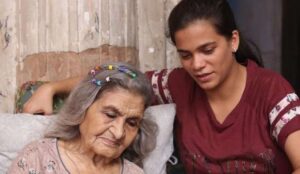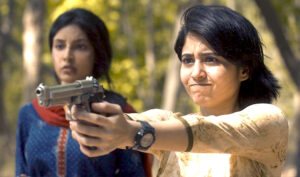OTTs bring women to the front of mainstream cinema

Four More Shots Please features an all-female cast who show audiences that the term "woman" is not limited to just one definition (Photo: Amazon)
While Bollywood has released a few woman-centric hit movies such as English Vinglish(2012), Queen (2013), and Mary Kom (2014), they have been exceptions and very few at that as the Indian cinema for long has been only male-centric. But within a few years, woman-centric content has made huge advances thanks to various OTT series, that mainstream cinema failed to deliver in over a century.
“On OTT, one can generally delve into many subjects or so-called taboo topics, but mainstream cinema has a few constraints. Many films, like Lipstick Under My Burkha(2016), went through a lot of hardships before being screened in theatres,” Archika Khurana, a movie critic for daily newspaper The Times of India, tells Media India Group.
Streaming platforms have undoubtedly helped bring in more diversity to Indian entertainment, not only in the stories and characters, but among the cast and crew as well. This is a vital step for gender equality in the entertainment industry, because it opens up more opportunities for women that have not been available before. More importantly, it allows Indian audiences to view things differently and dispel typical gender stereotypes that have stuck around for generations.
Streaming content depicts carefree women not constrained by societal expectations
Industry experts believe that another way to increase exposure is when established Bollywood celebrities, who have mostly been in mainstream cinema, choose to play these characters instead on the OTT platforms. This helps improve the credibility of OTT originals and brings in a larger audience.
“OTT is attracting the attention of Bollywood celebrities as well. For example, Lara Dutta and Sushmita Sen made comebacks in Disney+Hotstar originals Hundred (2020) and Aarya (2020) respectively, and Huma Qureshi is currently seen in SonyLiv originals Maharani (2021) playing a powerful politician. Swara Bhaskar may also be seen playing a tough cop in ErosNow originals Flesh (2020) which is about human trafficking, or in the Amazon Prime series Four More Shots Please (2019), which follows four women who want to live life on their own terms,” says Khurana.
Four More Shots Please is shot in a style similar to famous Hollywood hits such as Sex and the City (1998), and covers a range of issues, such as the stigma around single mothers, successful working women and LGBT romances. More notably, it demonstrates that there are multiple facets to the definition of “woman” – one can be girly and sweet and still be best friends with a tough gym rat or be focused on building their career while still wanting a family.

Shrishti Srivastava as Guddo, Ayushman’s ambitous, go-getter younger sister in Gulabo Sitabo, stole the show from the male characters
Yet, an all-female cast such as Four More Shots Please may not appeal to the majority of the public, and understandably so. In order to display the ‘strong, independent woman’ trope to a wider audience, filmmakers are increasingly introducing feminist storylines in already popular shows with male heroes.
“I believe that this wave of diversity and inward-looking approach in writing, directing, and other departments has also made male-dominated shows like Mirzapur (2018), films like Gulabo Sitabo (2020) more feminist,” says Devansh Sharma, a movie reviewer, blogger, and senior-sub editor of FirstPost, an Indian news and media website.
“As long as the gaze is feminist, the show or film may not pass the Bechdel’s test, but it will definitely lead to a more inclusive idea of filmmaking. And that will extend to not just Indian cinema but also in how we lead our lives,” Sharma adds.
The Married Woman (2021) stars Ridhi Dogra as a loyal wife and doting mother who embarks on a path of self-discovery, and Code M (2020) stars Jennifer Winget as army lawyer Monica Mehra who enters into a high-profile case only days before her wedding.
“With so many shows featuring males in uniform, it was refreshing to see a woman in charge. Females have a voice and well-crafted powerful characters in OTT, which allows them to easily break stereotypes,” says Khurana.
Portraying women from diverse backgrounds
Bollywood also has a responsibility to tell stories of women in Indian society as a whole, rather than only focusing on one sect.
“I think gender stereotypes are being broken not only through releases like Four More Shots Please and Bombay Begums (2021) but also with the more rooted, less urbane shows like Panchayat (2020) and Mirzapur. It is equally interesting to see already-empowered women face the brunt of patriarchy in ‘modern’, ‘educated’ setups as it is to witness women with less privileged backgrounds circumvent deeply entrenched patriarchy in their own ways – without judgement,” explains Sharma.

Shweta Tripathi plays a transformed Golu Gupta in Mirzapur (Photo: Amazon)
In Mirzapur, the character of Golu Gupta undergoes a physical transformation while thirsting for revenge for her sister and fiancé’s murders, symbolically ungendering herself as she cuts her hair short and establishes a dominant role in her relationship. In Gulabo Sitabo, Shoojit Sircar’s female protagonists fight against the archaic gender expectations that control their lives.
Several OTT shows have also brought women to the forefront in political storylines. Mirzapur’s Madhuri, for example, cleverly manages to propel herself out of her powerless position and shock her oppressive in-laws as she becomes the all-powerful chief minister.
“I recently reviewed Maharani, which is currently streaming on SonyLIV, and I think the series is handled really well. The show first focuses on the nitty-gritty of Bihar politics, but as it progresses, it highlights the subtle shades of Huma’s character (Rani) as well as her actions, allowing her to dominate the entire ensemble of men,” says Khurana.
Making space for these stories on mainstream cinema
Often, whether new screenplays are written about women or if producers or actors think it is worth it to take the gamble, the future outcome largely depends on the audience. At the end of the day, filmmakers have to make profit, which for a theatrical release, depends on filling seats. The need to cater to all tastes, limits artists and many creators who still believe that content specifically about women does not reach all types of people, and therefore the mainstream is still dominated by men.
“Mainstream cinema is also open to women-centric issues, but in order to score well at the box office or join the ‘100 crore (INR 1 billion) club’, a hero is required to run the show. It’s a sad fact, but it’s true,” says Khurana.
However, critics believe that with time, the prospects for theatrical releases will change as audience palettes become more accustomed to OTT standards.
“The days of Bollywood portraying women as damsels in distress, whose sole purpose in the film was to play the hero’s lovely romantic interest, are long gone. OTT platforms have produced excellent content during the pandemic especially, changing the rules of the game by making women crucial to the plot and depicting them as strong and independent characters. Things evolve with time, and individuals will be more open to all kinds of themes as a result of their exposure to OTT content, rather than [filmmakers] thinking of them as forbidden subjects,” Khurana explains.









